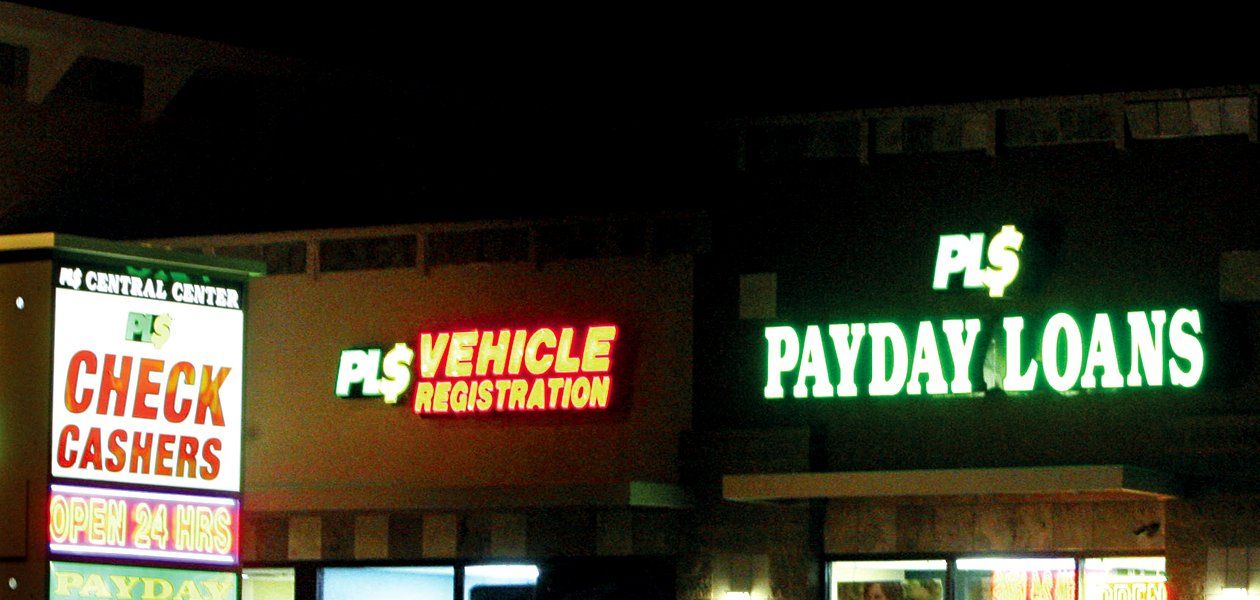
Sometime this spring, Democrats stopped calling Sen. Chris Dodd's bill "financial reform" and started calling it "Wall Street reform." Most of the reporting focused on the legislation's affect on the upper crust of finance—investment banks, private-equity firms, and hedge funds. But the bill President Obama signed into law last Thursday will have a lot to say about payday lenders, check cashers, and rent-to-own furniture stores—the blue-collar, not-even–Main Street joints.
That's to its credit. Michael Lewis's The Big Short is considered the definitive history of the financial crisis. (Dodd himself told his staffers to read it.) But to understand American finance, you need to understand Ace Cash Express as well as you do Goldman Sachs. Which is why Gary Rivlin's Broke, USA is a necessary companion. While Lewis tells the story of mortgage-backed assets and the bankers who flogged them, Rivlin tells the story of the underlying mortgages and the folks who bought them.
"To me, it was so counterintuitive," Rivlin says. "People with no money in their pockets is good for business?" But they were profitable. By 1996, there were more payday lenders than all the McDonald's and Burger Kings in the land combined.
Welders looking for an advance on a paycheck became unwitting cash cows for big banks. Schoolteachers taking out home loans became the collateral for leveraged bets on housing worked out in London and Greenwich, Conn. But before they were Wall Street grist, the working poor had to first become big business.
Unlike traditional banking, it wasn't about finding good credit risks who could repay their loans promptly. Quite the opposite, actually. The central insight was that you wanted people who couldn't quite stay ahead of the loan. Then you could use late fees and new loans to bleed them. Consider, for instance, the "yield-spread premium." It's an anodyne name for real financial villainy. If the person selling you your loan could lock you into a higher interest rate than your credit score would naturally give you, the lender would give the seller a kickback.
The size of the fraud was immense. An analysis by First American Loan Performance, a San Francisco–based research firm, found that 41 percent of the subprime mortgages sold in 2004 went to borrowers who qualified for prime-rate loans. A Wall Street Journal analysis found that in 2005, 55 percent of borrowers were sold subprime when they qualified for prime. That same First American study found that 61 percent of the subprime mortgages issued in 2006 went to borrowers who qualified for prime-rate mortgages. In 2007, of course, the housing market crashed, and then the financial system crashed with it.
Or take payday loans. Rivlin says that when he started his book he believed they were an important financial innovation. "What really turned my opinion on the payday loan was how aggressively they pushed them," Rivlin says. "This is a dangerous financial product"—the annual interest rate was typically around 300 percent—"and yet the industry marketed it like a soft drink or candy. Every chain I came across offered $20 off your next payday loan if you brought a friend, family member, or co-worker. More than a couple of the big chains would call people who had not been in the store in a month or two to persuade them to come back. Then there's the upsell. A customer comes in and asks for $200 but could qualify for $500. The store managers were instructed to point out no less than three times that they could qualify for $500. And they were giving these salesmen bonuses based on volume."
And it's only gotten worse since the financial crisis. Businesses that thrive on people needing access to emergency funds boom when unemployment skyrockets and wages dip, and millions find themselves struggling to make rent each month. So what happens next?
"Congress got that financial reform was largely about protecting consumers even if most pundits were talking about 'too big to fail' and derivatives," Rivlin says. "They banned yield-spread premiums and added a common-sense provision to the law that says a lender must take into account a borrower's ability to pay. They created an independent, well-funded consumer financial protection bureau with teeth. It's only a start as its powers are limited. But it's also exactly what consumer lobbyists and lawyers for the poor have been clamoring about for years: an agency overseeing the financial system that puts the consumer, and not the safety and soundness of the banks, first."
Uncommon Knowledge
Newsweek is committed to challenging conventional wisdom and finding connections in the search for common ground.
Newsweek is committed to challenging conventional wisdom and finding connections in the search for common ground.





